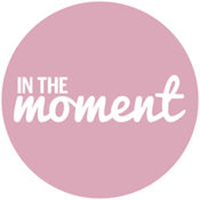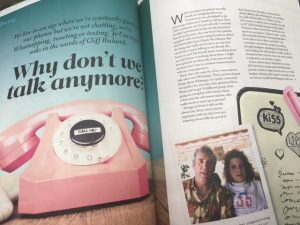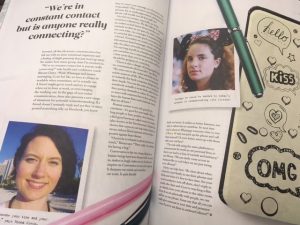
This month I talked with Jo Carnegie for In the moment magazine to discover how we might sustain authentic, real, human relationships and conversation in our increasingly digital age.
WHY DON’T WE TALK ANYMORE?
ARTICLE BY JO CARNEGIE FOR IN THE MOMENT MINDFULNESS MAGAZINE
Teenage Jo lived to talk on the phone (diary entries about arguments with my dad over eye-watering phone bills prove that) Nearly three decades on, she would be utterly baffled at this self-imposed vow of silence her adult self has taken on. ‘What? You have 24/7 access to a phone and you hardly ever talk on it?’ I did download an app recently called Moments, which records how much time you spend on your phone. I deleted it after a week, disconcerted at the fact I was spending three hours plus a day on there and while I was constantly connected to people by scrolling through Instagram, checking my Twitter feed, instant messaging and emailing, the only people I actually spoke to during that time were my mum and the receptionist at my doctor’s surgery.
In fact, when I stop to think about it, when did I last have a proper, good old- fashioned, put-the-worlds-to-right, bare-my-soul, cry-with-laughter chinwag with a mate? As much as I convince myself that Whatsapp is the way forward these days, all this electronic communication has left me with an inner emotional deficit and a feeling of slightly paranoid isolation that just won’t go away. No matter how many group chats I’m involved in.
“We’re in constant contact but is anyone really connecting?” asks Rhona Clews, a coach who teaches people how to be kinder to themselves. “With Whatsapp and instant messaging, it can feel like we have to always be available when sometimes, we’re actually not. A friend might get in touch and try to engage when you’re very busy at work, or even hanging the washing out. In the gaps of non-verbal communication there also presents a new range of situations for potential misunderstanding . If a friend doesn’t instantly reply to your message and yet you see they’ve since posted something silly on Facebook you know they’ve ‘seen’ your message, so why haven’t they responded? This can leave you feeling down-the-priority list or underappreciated, whereas a short phone call would sort all that stuff out.”
I do feel us women especially are doing ourselves a disservice. We like talking. It reassures us, makes us feel better about ourselves and reminds us that we are part of a wider community, our own tribe. As a teenager I remember feeling so <satiated> after a really good conversation with a friend. Nowadays we mainly exist on bite-sized, information-based messages, where cartoon emojis take the place of words and emotions. I feel like I’m starving myself on a fundamental level. We’ve put ourselves on a conversation diet when, at a time more than ever in an uncertain world, we should be gorging on proper conversations and connections.
‘There is also danger of losing empathy when we mainly communicate electronically,’ says Rhona. ‘We miss out on the verbal and facial cues, the subtle nuances of life. When you feel pressured to instantly fire back a response, things easily lose their depth. You can also miss out on seeing how somebody actually is in the flesh, rather than how they portray themselves online. It’s reassuring to meet with someone face to face and see they have the human flaws and existential worries that we all have. It undoes the myth of perfection that thrives online, and actually connects people.’
Human contact is not only good for the emotions – it’s good for your health. When we hug people or have positive close interaction, a feel-good hormone called oxytocin is released (also known as the ‘love hormone’) Research has shown that oxytocin can help reduce anxiety and stress, reduce blood pressure and help protect against heart disease. “Oxytocin is released in physical presence and touch” Rhona says. “There really is no substitute for having a hug.”
Conversation is the one unique thing that us human beings have been blessed with. It connects us, makes us laugh, makes us cry, informs and inspires us. Conversation is sexy and invigorating. It sharpens our minds and nourishes our souls. It quite literally, heals our hearts. It makes us better listeners, not only to others but to ourselves. We owe ourselves more, we owe our friends and partners and families more. So next time you go to Whatsapp someone close in your life a [INSERT WAVING HAND EMOJI HERE] or a [INSERT WINKY FACE BLOWING KISSES HERE], why not pick up the phone and call them instead? Or even better, meet face to face?
“The risk with using the same platforms to communicate for work as our personal lives, is that it can lead to a loss of warmth and intimacy,” says Rhona. “We can easily come across as business-like or cool when we are just trying to be efficient!” Clarity can help here. “Be clear about when is best for your family to use their phones and iPads and when it’s face-to-face time. Keep phones away from food and mealtimes, set your own boundaries: turn off alerts, don’t reply to emails after 8pm and if you’re watching a film as a family, leave your phone in the other room. Communicating clearly does require leadership and courage and you might get it wrong before you strike the balance. Even if we are physically with people, we can still spend the time on our phone, which means we’re not engaged properly either way. Sometimes it’s good to just ‘be’ with each other, even if you’re sat there in awkward silence! Some say that all you can ever really give someone is your time and presence.”
You can read more from Jo Carnegie here. You can read more about In the moment and Project Calm here.
Text by Jo Carnegie. Images from In the moment magazine feature September 2017.










